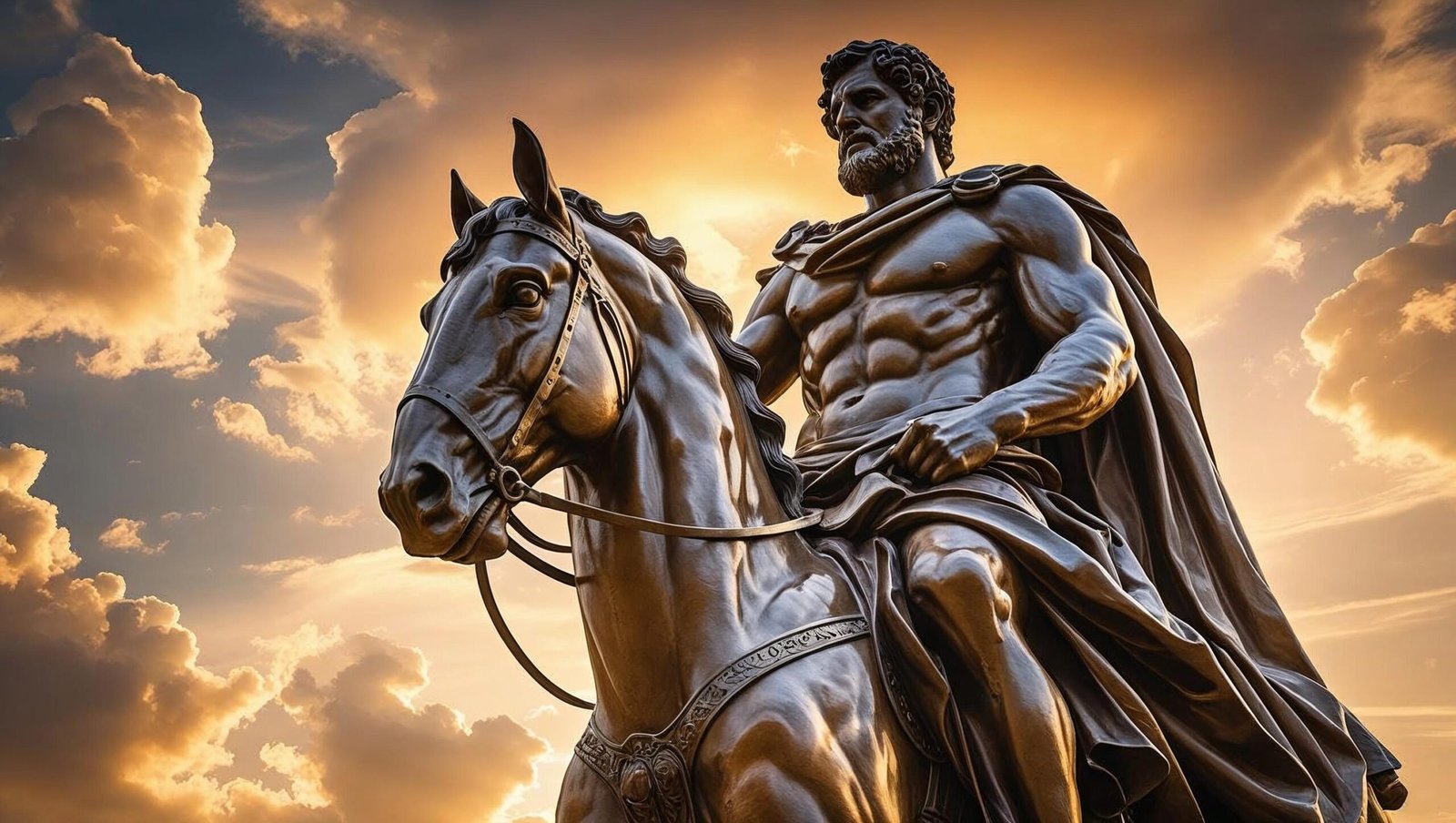Introduction
Among the most enduring texts of ancient philosophy, Meditations by Marcus Aurelius stands as a beacon of timeless wisdom. Written not for an audience but for himself, this remarkable work offers deep insight into the Stoic mindset, the practice of virtue, and the resilience of the human spirit. Despite being penned nearly two millennia ago, its teachings resonate profoundly with modern readers seeking purpose, composure, and ethical clarity in a chaotic world.
As we dissect the philosophical treasures contained in Meditations by Marcus Aurelius, we uncover lessons that transcend the ages—on self-discipline, mortality, humility, leadership, and inner peace. This blog post explores seven transformative lessons from the book, demonstrating how Marcus Aurelius’s private reflections can guide our public lives.
Let us embark upon this introspective journey.

Lesson 1: Control What You Can, Accept What You Cannot
One of the central themes of Meditations by Marcus Aurelius is the distinction between what lies within our control and what does not. This simple yet powerful Stoic insight is repeated throughout his entries. The Roman Emperor persistently reminds himself that external events are beyond his power, and only his own reactions, decisions, and thoughts lie within his jurisdiction.
In a world dominated by uncertainty and external pressures, Meditations by Marcus Aurelius teaches us to ground ourselves in our own reason and moral intention. The serenity born from this principle is liberating—it shifts our energy from worrying about circumstances to mastering our responses.
Lesson 2: Death Is Natural—So Live Wisely
The awareness of mortality permeates Meditations by Marcus Aurelius. Far from being morbid, his contemplation of death is life-affirming. He writes: “Do not act as if you were going to live ten thousand years. Death hangs over you. While you live, while it is in your power, be good.”
This Stoic emphasis on impermanence prompts the reader to cherish the present and act virtuously. The inevitability of death is not a reason for despair but a call to focus on what truly matters. Meditations by Marcus Aurelius is, in essence, a guide to living meaningfully in the shadow of our finite existence.
Lesson 3: You Are Part of a Greater Whole
Throughout Meditations by Marcus Aurelius, the emperor reflects upon the interconnectedness of all things. He often reminds himself that he is a part of the universe, a citizen of the world. This cosmic perspective fosters humility and compassion.
Rather than seeing ourselves as isolated individuals, Marcus encourages us to recognize our roles within the fabric of society and nature. By aligning our actions with the common good and the natural order, we live in accordance with Stoic virtue. The insights from Meditations by Marcus Aurelius challenge our modern emphasis on individualism, offering a more holistic view of existence.
Lesson 4: Master the Inner Citadel
A recurring metaphor in Meditations by Marcus Aurelius is that of the “inner citadel”—a mental fortress that shields us from external turmoil. Marcus asserts that no matter what happens outside us, our minds remain our own. This Stoic concept is akin to psychological resilience in modern terms.
In an age of information overload, social comparison, and external chaos, the wisdom of Meditations by Marcus Aurelius urges us to turn inward and cultivate fortitude. Our peace is not contingent on others’ opinions or life’s circumstances but on the health of our own minds.

Lesson 5: Practice Virtue in Every Role You Play
Whether as a leader, father, soldier, or philosopher, Marcus Aurelius constantly reminded himself to embody virtue—justice, courage, temperance, and wisdom. Meditations by Marcus Aurelius is filled with exhortations to act rightly in every role, regardless of reward or recognition.
He believed that excellence of character is its own reward. Even as the most powerful man of his time, Marcus wrote with surprising humility, reminding himself to serve rather than dominate, to listen rather than boast, and to act rather than merely speak.
His example calls us to practice integrity in our own positions—no matter how ordinary or grand.
Lesson 6: Let Reason Govern Emotion
“If you are distressed by anything external, the pain is not due to the thing itself, but to your estimate of it.” This line from Meditations by Marcus Aurelius encapsulates the Stoic belief in the supremacy of reason. While emotions are natural, they need not control us.
Marcus did not advocate for emotionlessness, but rather for the mastery of emotion through clear thinking. He believed that by interrogating our impulses and judgments, we can maintain clarity even in adversity. In today’s emotionally reactive culture, Meditations by Marcus Aurelius reminds us that reason is the compass of a wise life.
Lesson 7: Live in Accordance with Nature
The idea of living in harmony with nature recurs throughout Meditations by Marcus Aurelius. For the Stoics, this did not mean hugging trees, but rather living in accordance with human nature—rational, social, and moral.
Marcus emphasizes that our nature is to reason, to act justly, to contribute, and to accept what befalls us with dignity. In embracing this path, Meditations by Marcus Aurelius provides not just philosophical reflections but a daily code of conduct. It asks us to live simply, honestly, and purposefully.
Why Read Meditations by Marcus Aurelius Today?
In the modern era of noise, haste, and egoism, Meditations by Marcus Aurelius offers a quiet, reasoned, and compassionate antidote. It speaks to the universal human experience—struggles with ego, mortality, uncertainty, and desire.
More than a Stoic textbook, it is a personal journal. And therein lies its power. We are not preached at but invited into the mental workshop of a man who bore the weight of an empire while striving to be good.
The raw humanity of Meditations by Marcus Aurelius connects us across centuries, proving that philosophy is not merely to be studied, but lived.

The Wider Context of Stoic Philosophy
To fully appreciate the Roman emperor’s reflections, it is essential to delve into the origins and principles of the philosophical school he subscribed to. The foundation of this ancient school of thought was laid in Athens by Zeno of Citium in the early 3rd century BCE. He taught in the Stoa Poikile—a painted colonnade—which eventually gave the discipline its name.
At its core, Stoicism asserts that human flourishing is found not in external possessions or social status, but in virtue alone. Virtue, for the Stoics, is the only true good, and it consists of wisdom, courage, temperance, and justice. By living in accordance with nature and reason, one aligns with the rational order of the cosmos and attains tranquility.
The Stoics did not retreat from society or advocate for a life of seclusion. Rather, they encouraged active participation in civic duties while maintaining emotional resilience and moral integrity. The path to peace lies not in avoiding hardship, but in confronting it with dignity.
Key Figures Who Shaped Stoic Thought
While the aforementioned Roman ruler may be the most widely read figure from this tradition today, he stands on the shoulders of earlier giants. One cannot discuss this school of thought without paying homage to Epictetus and Seneca.
Epictetus, a former slave turned teacher, emphasized that external events cannot harm the soul unless we permit them to. His discourses and manual, The Enchiridion, contain practical advice that aligns remarkably well with contemporary cognitive behavioural therapy. He taught that the path to freedom lies in the proper use of one’s mind and will.
Seneca, a statesman and playwright, corresponded with contemporaries in a collection of letters that continue to resonate. His writings offer insights on friendship, mortality, anger, and wealth, urging readers to remain serene in the face of misfortune. Despite immense political pressures, he strove to uphold Stoic ideals—a challenge all too familiar to those in positions of influence.
The convergence of these three thinkers provides a robust framework for ethical living, underscoring the adaptability of their teachings across various stations in life—from slavery to political power.
Modern-Day Applications of Ancient Wisdom
Though ancient in origin, Stoicism enjoys a contemporary resurgence, particularly among those seeking mental clarity and strength amid digital chaos. Entrepreneurs, athletes, military leaders, and psychologists increasingly draw from its tenets.
In the corporate world, where burnout and stress run rampant, the Stoic ideal of focusing solely on what lies within one’s power has become a mental anchor. The teachings prompt leaders to act with fairness, resist vanity, and make decisions based on principle rather than pressure.
Professional athletes often internalize the idea of “preparing the mind” as much as the body. The discipline and composure advocated by the Stoics help competitors manage failure, success, and self-expectations. In this way, ancient principles merge with modern performance psychology.
Even in therapy, Stoic concepts have gained traction. Techniques like reframing and detachment from irrational thoughts mirror Stoic practices. Indeed, the cognitive reappraisal central to modern therapy closely parallels ancient meditative disciplines.
The Relevance of Self-Reflection in the Digital Age
One of the most powerful practices that this school of thought advocates is journaling. Self-examination, or daily reflection, allows one to review one’s actions, correct missteps, and reinforce noble intentions. This act, once common among philosophers, is now seeing a renaissance through modern productivity tools and guided journals.
The cacophony of the digital era often drowns the inner voice. Algorithms bombard us with distraction, while social media incites comparison and envy. In this climate, taking time to reflect in solitude has become an act of rebellion and restoration.
Writing down one’s thoughts, as the ancient Roman did, is not merely a literary exercise—it is a moral one. The process anchors the soul, distills emotion, and reveals the alignment (or misalignment) of one’s actions with one’s values.
This practice need not be elaborate. A few lines a day asking, “What did I do well? What could I have done better?” can yield profound transformation. It is in silence that the soul gathers its strength.

Misconceptions About Stoicism
A prevalent misunderstanding about this philosophy is that it advocates emotional suppression. Critics often mistake Stoic calm for apathy or detachment. However, a closer reading reveals otherwise.
Rather than denying emotions, Stoicism seeks to understand them, regulate them, and prevent them from dictating one’s conduct. Grief, anger, fear, and joy are all natural; the Stoic merely refuses to become their slave.
This nuance is critical. The goal is not to become robotic or aloof but to cultivate equanimity. The Stoic does not deny suffering but accepts it as part of the human experience, choosing to respond with grace rather than despair.
Balancing Action with Acceptance
Another vital feature of Stoicism is the balance between effort and surrender. The Stoic does not passively accept fate but strives to act righteously within the bounds of nature and reason. When outcomes do not conform to desire, acceptance replaces resistance—not out of weakness, but wisdom.
This paradoxical interplay between action and acceptance is deeply liberating. It means one can pursue goals with vigour while releasing attachment to results. In doing so, the individual remains committed to principle, not outcome—a distinction that protects the soul from bitterness and vanity alike.
The Role of Duty and Service
Within this school of thought lies a profound respect for duty—especially toward family, community, and society at large. The ideal individual sees their role not as a means of self-aggrandizement but as an opportunity to contribute meaningfully.
One does not complain about responsibility, nor shirk from it. Whether one is a teacher, physician, merchant, or artist, their work becomes a canvas for expressing virtue. To live well is to serve well.
This spirit stands in stark contrast to the narcissism that often pervades modern culture. The ancient teachings remind us that dignity is found not in self-promotion, but in conscientious participation in the human symphony.
Living Without Fear of Death
Perhaps no other theme recurs as frequently as the contemplation of mortality. This was not a source of morbidity, but a path to freedom. By keeping the end in view, the Stoic is liberated from petty anxieties, vain pursuits, and procrastination.
Death is not to be feared but understood as a natural process, one shared by all who have ever lived. From emperors to peasants, kings to beggars, all must pass through that final gate. The realization of this universal truth invites one to live more urgently, more authentically.
To delay virtue or postpone gratitude in the hope of “later” is, in this worldview, the gravest of mistakes. Each moment becomes sacred because it may be the last.
The Importance of Temperance in an Age of Excess
Self-restraint may be the least celebrated virtue today, yet it is among the most crucial. Ancient teachings extol the value of moderation—not just in food or drink, but in speech, desire, consumption, and opinion.
In a consumer-driven world, where indulgence is often equated with freedom, the call to temperance seems almost subversive. Yet it is precisely this restraint that guards against addiction, waste, and regret.
True freedom is not doing whatever one wants, but mastering the self to act in alignment with wisdom. The one who governs their appetites is not only virtuous but genuinely powerful.
The Stoic Leader: A Model for Our Times
Leadership, when viewed through the lens of this philosophy, is not about domination but stewardship. A leader is one who serves, who leads by example, who remains calm amid chaos, and who places principle above popularity.
Such leadership is sorely needed today—in politics, business, education, and even the family unit. The archetype of the philosopher-king is not utopian fantasy but a reminder of what is possible when power is tempered by virtue.
Through patience, justice, and humility, the Stoic leader becomes a source of stability and hope. Their influence endures not because they imposed their will, but because they elevated others through their character.

Final Thought
To read the reflections of a man who wielded the highest power yet sought to live as a humble philosopher is to witness a rare fusion of wisdom and authority. Meditations by Marcus Aurelius offers not just personal insights, but a timeless blueprint for self-mastery, duty, and resilience. These principles do not require academic degrees or ancient lineage—they ask only for sincerity, effort, and reflection.
In an age yearning for clarity and purpose, Meditations by Marcus Aurelius still speaks—calmly, firmly, and always from within. It is a companion not merely to be read, but to be returned to, lived by, and contemplated in quiet moments of resolve.
Frequently Asked Questions (FAQs)
1. Is Meditations by Marcus Aurelius difficult to understand?
While written in a formal style, many translations render the thoughts accessibly. Some passages may be abstract, but most reflections are deeply relatable.
2. What is the best translation of Meditations by Marcus Aurelius?
The translation by Gregory Hays is widely praised for its clarity and contemporary tone. Other respected versions include those by Martin Hammond and Maxwell Staniforth.
3. Is Meditations by Marcus Aurelius relevant for modern readers?
Absolutely. Despite being nearly 2000 years old, its insights into resilience, virtue, and human nature are timeless and deeply applicable today.
4. Is this book suitable for beginners in philosophy?
Yes. In fact, Meditations by Marcus Aurelius is often recommended as an entry point to Stoic thought due to its personal, reflective tone.
5. How should one approach reading Meditations by Marcus Aurelius?
It is best read slowly, reflectively—perhaps one entry per day. The structure is not linear, and the value lies in pondering the meaning behind each meditation.
Conclusion
“Waste no more time arguing about what a good man should be. Be one.”—This powerful directive from Meditations by Marcus Aurelius captures the essence of Stoicism: a philosophy of action rooted in virtue, reason, and acceptance.
Marcus Aurelius did not write this book for fame. He wrote it to become a better person. That this private journal continues to guide millions across cultures and centuries is a testament to its truth.
If you are seeking inner strength, ethical clarity, or simply a deeper understanding of life, Meditations by Marcus Aurelius is not just a book—it is a companion for the journey.
For more philosophical reviews and insightful breakdowns, explore my other book reflections at shubhanshuinsights.com.
Powerful Comments to Encourage Engagement
-
“This review deepened my understanding of Marcus Aurelius’s wisdom. Thank you!”
-
“Incredible breakdown! I feel inspired to read Meditations by Marcus Aurelius again.”
-
“Stoicism always intrigued me, but this post helped me connect it to real life.”
-
“Your insights on inner fortitude are so timely in today’s noisy world.”
-
“Please review more classics like this—so well-written and powerful!”
Let the timeless reflections in Meditations by Marcus Aurelius guide your soul daily, for in Meditations by Marcus Aurelius lies the enduring compass for inner strength, clarity, and purposeful living.